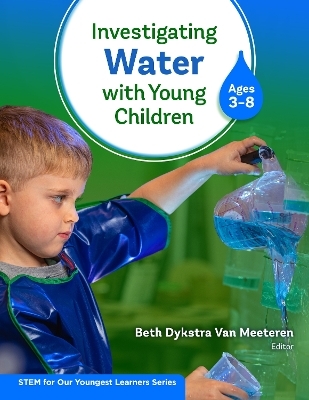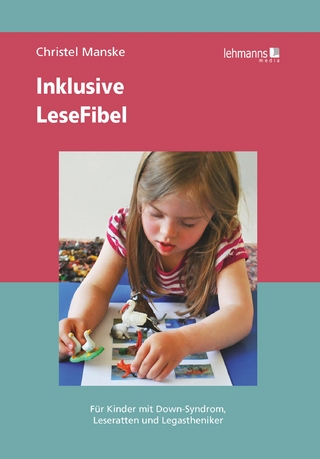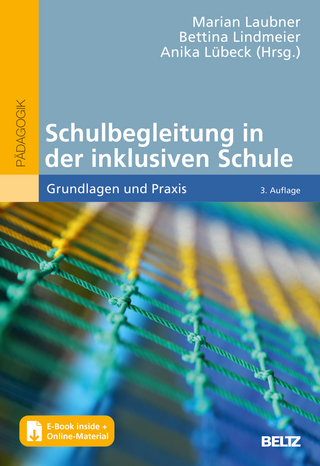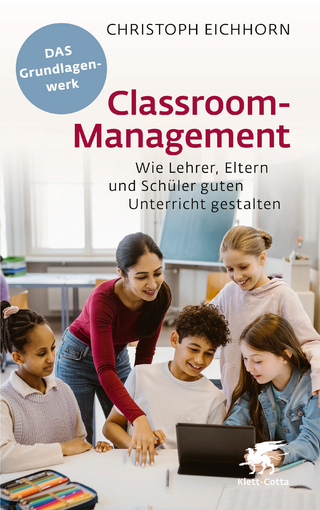
Investigating Water With Young Children (Ages 3–8)
Teachers' College Press (Verlag)
978-0-8077-6904-1 (ISBN)
- Titel z.Zt. nicht lieferbar
- Versandkostenfrei innerhalb Deutschlands
- Auch auf Rechnung
- Verfügbarkeit in der Filiale vor Ort prüfen
- Artikel merken
Water is a meaningful context for children to engage in inquiry, and to acquire and use science and engineering practices, such as developing spatial thinking and early concepts of water dynamics. This book shows teachers how to provide children with opportunities to engineer water movement through pouring and filling containers of various kinds and shapes, observing how water interacts with surfaces in large and small amounts, exploring how water can be moved, and using water to move objects. These experiences build a foundation that will support children’s more complex study of this phenomena in later schooling, as well as encourage interest in STEM fields. The text offers guidance for arranging the social–emotional, intellectual, and promotional environments of the early childhood classroom; for integrating literacy learning; and for building essential partnerships with administrators and families to enhance STEM learning for our youngest learners.
Book Features:
Introduces Waterworks, an integrative STEM experience developed by young children, their teachers, and early childhood researchers.
Describes an approach that engages children in doing science and engineering, rather than teaching children about these fields.
Offers children the opportunity to participate in STEM experiences every day in their classrooms alongside literacy learning.
Illustrates ways to plan and use over 10 types of engineering experiences appropriate for children ages 3–8.
Includes guidance for documenting children’s learning over time.
Aligns with the Early Learning Outcomes Framework and the Next Generation Science Standards.
Beth Dykstra Van Meeteren is director of the Iowa Regents' Center for Early Developmental Education and professor of literacy education at the University of Northern Iowa.
Acknowledgements
1. STEM on Their Own Terms
Beth Dykstra Van Meeteren
Who We Are
Who We Hope You Are
Who We Are Writing About
Inquiry
Engineering
Preparing an Environment for STEM
Summary
2. School Partnerships that Support High Quality STEM
Tuning the Instrument
Teaching as Jazz
Getting the Band Together
Integrative STEM and Literacy
STEM Experiences Executive Functions
Summary
3.Weaving Waterworks Experiences Through the Standards for Meaningful Learning
The Warp and the Weft of Learning and Teaching
Weaving Waterworks Experiences Through the NGSS
Weaving Through the NGSS Science and Engineering Practices
Weaving Through the NGSS Cross Cutting Concepts
Aligning Waterworks Experiences With Preschool Standards
Weaving Through the Early Learning Outcomes Framework
Summary
4. Arranging Space to Investigate Waterworks
Teachers as Engineers
Large Group: A Space to Gather as a Community of Learners
Small Group: A Space for Focused Literacy Learning
A Space for Art and to Document Learning
A Space for STEM
Materials That Contain Water
Materials to Move Water
Materials to Absorb and Repel Water
Coordinating Children’s Movement Among Spaces
Introducing Waterworks Materials
Class Meetings: Nurturing a Community of Learners
STEM as a Context for Writing
Summary
5. Planning and Implementing Experiences in Waterworks in PK–2 Classrooms
Beginning With Teacher Play
Scaffolding Child Inquiry With Productive Questions
Assessment in Waterworks
Preparing For a Paradigm Shift
EXPERIENCE 1. A SET OF SAME-SIZED-SHAPED CONTAINERS
Attending to the Four Aspects of the Environment
EXPERIENCE 2. A SET OF A VARIETY OF CONTAINERS
Attending to the Four Aspects of the Environment
EXPERIENCE 3. A SET OF CONTAINERS WITH HOLES
Attending to the Four Aspects of the Environment
4. A SET OF CONTAINERS WITH DIFFERENT LIDS
Attending to the Four Aspects of the Environment
EXPERIENCE 5: A SET OF MATERIALS TO EXPLORE THE DRAINING OF WATER
Attending to the Four Aspects of the Environment
EXPERIENCE 6: A SET OF TUBES, STOPPERS, AND FUNNELS
Attending to the Four Aspects of the Environment
EXPERIENCE 7: A SET OF PUMPS FOR A MUSEUM
Attending to the Four Aspects of the Environment
EXPERIENCE 8: A SET OF LEAKY CUPS
Attending to the Four Aspects of the Environment
EXPERIENCE 9: A SET OF LEAKY CUPS AND A WATER WALL
Attending to the Four Aspects of the Environment
EXPERIENCE 10: A SET OF WATER PIPES
Attending to the Four Aspects of the Environment
EXPERIENCE 11: A SET OF MATERIALS TO EXPLORE WATER DROPLETS
Attending to the Four Aspects of the Environment
EXPERIENCE 12. A SET OF MATERIALS TO EXPLORE HOW OBJECTS SINK AND FLOAT
Attending to the Four Aspects of the Environment
Summary
Dawn Johnson—Integrative STEM and Literacy in the Preschool Classroom
6. Family and Community Engagement With Waterworks
The Value of Partnering With Families
Listen, Learn, and Build Relationships With Families
Empower Parents With Research and Resources
Prioritize Access and Inclusion
Provide Professional Development for Impactful Family Engagement
Evaluate Impact
Summary
Appendix A: Engineering Habits of Mind in Waterworks
Appendix B: Progress Monitoring of Young Students’ Engineering Habits of Mind
Appendix C: Recording Sheet for Home Scavenger Hunts
References
Index
About the Editor and Contributors
| Erscheinungsdatum | 27.10.2023 |
|---|---|
| Reihe/Serie | STEM for Our Youngest Learners Series |
| Co-Autor | Allison Barness, Shelly L. Counsell, Judith M. Finkelstein, Linda May Fitzgerald |
| Verlagsort | New York |
| Sprache | englisch |
| Maße | 216 x 279 mm |
| Gewicht | 227 g |
| Themenwelt | Schulbuch / Wörterbuch |
| Sozialwissenschaften ► Pädagogik ► Schulpädagogik / Grundschule | |
| Sozialwissenschaften ► Pädagogik ► Vorschulpädagogik | |
| ISBN-10 | 0-8077-6904-5 / 0807769045 |
| ISBN-13 | 978-0-8077-6904-1 / 9780807769041 |
| Zustand | Neuware |
| Informationen gemäß Produktsicherheitsverordnung (GPSR) | |
| Haben Sie eine Frage zum Produkt? |
aus dem Bereich


